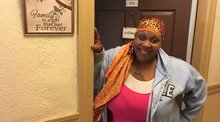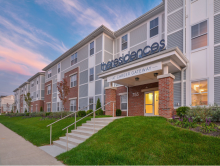0
Publication
Community:
Dec 1, 2022
Local initiatives are breaking new ground to make access to housing and opportunity more affordable and equitable and to increase the resources dedicated to housing justice.
Authored by: Mercedeh Mortazavi & Alana Greer for the Sandford Social Innovation Review
Topics: Community development, Housing, Legislation & Policy, Partnerships, Racial inequalities
 Shared by Sandra Ware
Shared by Sandra Ware
Sandra Ware posted a
on Jan 3, 2023
Mercedeh Mortazavi & Alana Greer for the Sandford Social Innovation Review
Local initiatives are breaking new ground to make access to housing and opportunity more affordable and equitable and to increase the resources dedicated to housing justice.
0
Report
Community:
Jun 29, 2022
Looking largely at the 2020-2021 school year, the report is chock-full of information about how schools apply research-based strategies in a variety of different contexts – from very different school systems across multiple states – to make research translate into positive experiences and outcomes for students and their teachers in three critical areas:
• Instructional work, where math or English-language-arts teams, including instructional coaches, special-education teachers, and English learner/multilingual teachers, work to improve the quality of instruction within classrooms.
• Early Warning and Response strategies, where grade-level or cross-functional teams work to create more supportive school environments, where young people are connected to adults, each other, and the school community.
• Well-Matched Postsecondary initiatives, where school-based teams of counselors, service providers, district and school leaders, teachers, and other staff band together to implement evidence-based strategies and processes that support postsecondary application, enrollment, and persistence.
At its heart, improvement is about learning. Each of these networks study their own work, and consistently and strategically make adaptations to increase their effectiveness as the organizational hub supporting schools. And they demonstrate how lessons need not fade away, but when codified, systematized, and shared, they can deepen our collective capacity to accelerate the field’s learning and growth.
Authored by:
Topics: Advocacy, Attendance, Child welfare, CLPHA, Community development, Education, Grade-level proficiency, Housing, Literacy, Low-income, Partnerships, Place-based, Supportive housing, Sustainability, Youth
 Shared by Karina George
Shared by Karina George
Karina George posted a
on Jun 29, 2022
Looking largely at the 2020-2021 school year, the report is chock-full of information about how schools apply research-based strategies in a variety of different contexts – from very different school systems across multiple states – to make research translate into positive experiences and outcomes f
0
Video
Community:
Jun 17, 2022
The Columbus Metropolitan Housing Authority (CMHA) has formed a partnership with the Healthcare Collaborative of Greater Columbus (HCGC) and their Central Ohio Pathways HUB to provide supportive services to all 14,000 CMHA-assisted households. HCGC’s HUB is a nationally certified program focused on addressing the Social Determinants of Health in an effort to improve health outcomes for at-risk populations. The HUB oversees 10 Care Coordination Agencies (CCAs) and their employed Community Health Workers (CHWs) to provide these services. The HUB contracts with Medicaid Managed Care Organizations, who provide payments to the HUB for services called Pathways delivered to their members.
Authored by:
Topics: Advocacy, Community development, Housing, Partnerships, Racial inequalities, Research, Supportive housing, Sustainability
 Shared by Karina George
Shared by Karina George
Karina George posted a
on Jun 17, 2022
The Columbus Metropolitan Housing Authority (CMHA) has formed a partnership with the Healthcare Collaborative of Greater Columbus (HCGC) and their Central Ohio Pathways HUB to provide supportive services to all 14,000 CMHA-assisted households.
0
Video
Community:
Jun 17, 2022
The Administration for Community Living’s Aging and Disability Network is a multifaceted service infrastructure for older adults and people with disabilities so they can find housing and obtain services like chore assistance, delivered meals, and transportation. By partnering with this community infrastructure, PHAs can improve voucher utilization and leverage and align resources so older adults, people with disabilities, and people experiencing homelessness —all priority populations for federal housing assistance—can obtain supportive services needed to attain housing stability, optimize well-being, and avoid homelessness and costly institutional care. Join this session to learn about PHA partnerships with this infrastructure, discuss the dynamics of cross-sector partnerships in community-driven approaches, and discover opportunities available through the Housing and
Services Resource Center.
Authored by:
Topics: Advocacy, Community development, Disabilities, Health, Housing, Partnerships, Research, Seniors, Supportive housing, Sustainability
 Shared by Karina George
Shared by Karina George
Karina George posted a
on Jun 17, 2022
The Administration for Community Living’s Aging and Disability Network is a multifaceted service infrastructure for older adults and people with disabilities so they can find housing and obtain services like chore assistance, delivered meals, and transportation.
0
Video
Community:
May 18, 2021
Roundtable: Cross-Sector Efforts on COVID-19.
More than a year into a global pandemic, we continue to see disparities in infections, access to care, and economic supports, with an unequal burden on low-income and communities of color. This roundtable will discuss perspectives from housing, health, and policy for what we have seen and what may be to come, as well as ideas we may enact to create more permanent solutions, in addition to addressing current crises.
Authored by: CLPHA
Topics: CLPHA, Community development, COVID-19, Education, Health, Housing, Partnerships
 Shared by Housing Is
Shared by Housing Is
Housing Is posted a
on May 18, 2021
Roundtable: Cross-Sector Efforts on COVID-19.
More than a year into a global pandemic, we continue to see disparities in infections, access to care, and economic supports, with an unequal burden on low-income and communities of color.
0
Podcast
Community:
Jan 13, 2021
On a day-to-day basis, vulnerable populations suffer from inequities in health, wealth, and education. These same people are then disproportionately impacted by catastrophes ranging from hurricanes to COVID-19, which only serve to underline the great and urgent need for equity across race, gender, and income. In the latest episode of The Intersect, Madeline Colety and Lorine Giangola discuss how Abt’s housing and resilience work is helping clients promote equity.
Authored by: Madeline Colety & Lorine Giangola for ABT ASSOCIATES
Topics: Advocacy, Community development, Education, Food insecurity, Health, Healthy homes, Homelessness, Housing, Low-income, Partnerships, Racial inequalities
 Shared by Housing Is
Shared by Housing Is
Housing Is posted a
on Jan 14, 2021
Madeline Colety & Lorine Giangola for ABT ASSOCIATES
On a day-to-day basis, vulnerable populations suffer from inequities in health, wealth, and education.
0
Report
Community:
Jun 6, 2019
Trends in Housing Assistance and Who it Serves
Authored by: PAHRC
Topics: Community development, Disabilities, Education, Funding, Health, Homelessness, Housing, Legislation & Policy, Low-income, Partnerships, Research, Seniors, Workforce development, Youth
 Shared by Keely Stater
Shared by Keely Stater
Keely Stater posted a
on Sep 10, 2019
Trends in Housing Assistance and Who it Serves
0
Report
Community:
Apr 8, 2019
While the program has changed very little since its inception, the need for the program has increased. In 1975, the number of program grantees stood at 594. Today, the number of grantees stands at 1,268 as more communities qualify to receive direct program allocations. Based on a CDBG Needs Survey conducted by the CDBG Coalition (and discussed later in this report), CDBG grantees have delayed and canceled projects and reduced or permanently eliminated programs because of a lack of CDBG funds. CDBG is an important investment tool for communities and neighborhoods, but program funding must increase to meet local need to ensure CDBG grantee communities are healthy, vibrant and thriving.
Authored by:
Topics: Community development, Funding, Health, Homelessness, Housing, Legislation & Policy, Low-income, Partnerships, Research, Safety, Seniors
 Shared by Housing Is
Shared by Housing Is
Housing Is posted a
on Apr 8, 2019
A report of the CDBG Coalition
While the program has changed very little since its inception, the need for the program has increased. In 1975, the number of program grantees stood at 594. Today, the number of grantees stands at 1,268 as more communities qualify to receive direct program allocations.
0
Research
Community:
Feb 22, 2019
Thoughtfully developed, accessible communities may boost parent engagement and student outcomes in low-income neighborhoods
Authored by: Rachel Sturtz for University of Colorado Denver
Topics: Community development, Education, Family engagement, Housing, Low-income, Partnerships, Racial inequalities, Transportation
 Shared by Housing Is
Shared by Housing Is
Housing Is posted a
on Apr 4, 2019
Rachel Sturtz for University of Colorado Denver
Thoughtfully developed, accessible communities may boost parent engagement and student outcomes in low-income neighborhoods
0
Publication
Community:
Mar 20, 2019
To equip municipalities with the skills and tools to address these challenges, New York State created the $12 million Cities for Responsible Investment and Strategic Enforcement (Cities RISE) program, which provides leadership, management, and technical support to help 16 municipalities address deteriorating homes, vacant properties, and neighborhood decline through strategic code enforcement. Cities RISE uses code enforcement strategies to advance broader community development goals, and, in doing so, helps municipalities align programs aimed at improving residents’ quality of life.
Authored by: Aaron Shroyer How Housing Matters (The Urban Institute)
Topics: Community development, Data sharing, Homelessness, Housing, Legislation & Policy, Partnerships
 Shared by Housing Is
Shared by Housing Is
Housing Is posted a
on Mar 26, 2019
Aaron Shroyer How Housing Matters (The Urban Institute)
To equip municipalities with the skills and tools to address these challenges, New York State created the $12 million Cities for Responsible Investment and Strategic Enforcement (Cities RISE) program, which provides leadership, management, and technical support to help 16 municipalities address dete
0
News Article
Community:
Mar 12, 2019
Kaiser is investing $200 million in low-interest loans for affordable housing nationwide. This may be part of a growing national trend of health maintenance organizations investing in housing to improve community health. In Phoenix, United Healthcare lent money to a community development corporation, Chicanos Por La Causa, to purchase apartment complexes for Medicaid recipients. In Chicago, the University of Illinois Hospital helps to find permanent housing for homeless people who regularly present at its emergency department.
Authored by: Raquel Maria Dillon for Market Place
Topics: Affordable Care Act, Community development, Health, Homelessness, Housing, Low-income, Partnerships, West Coast
 Shared by Mica O'Brien
Shared by Mica O'Brien
Mica O'Brien posted a
on Mar 14, 2019
Raquel Maria Dillon for Market Place
Kaiser is investing $200 million in low-interest loans for affordable housing nationwide. This may be part of a growing national trend of health maintenance organizations investing in housing to improve community health.
0
Report
Community:
These Principles are derived from a thematic review of mission statements and principles from 35 organizations representing the community development, health, academic, government, finance, and philanthropic sectors. More than 200 respondents provided over 1,800 comments which helped refine the Principles below.
Authored by: Build Healthy Places Network
Topics: Community development, Health, Housing, Partnerships, Racial inequalities
 Shared by Housing Is
Shared by Housing Is
Housing Is posted a
on Mar 11, 2019
Build Healthy Places Network
These Principles are derived from a thematic review of mission statements and principles from 35 organizations representing the community development, health, academic, government, finance, and philanthropic sectors.
1
News Article
Community:
Jun 11, 2018
At a recent public meeting, Sandra Lee Fewer, a member of the city’s Board of Supervisors, asked acting librarian Michael Lambert to explore whether future library renovations might include affordable housing. Fewer hopes to leverage existing public land to create multi-story facilities that include both libraries and housing.
Authored by: Steve Dubb for NPQ
Topics: Community development, Homelessness, Housing, Literacy, Low-income, Partnerships, Place-based, Research, Youth
 Shared by Housing Is
Shared by Housing Is
Housing Is posted a
on Jan 29, 2019
At a recent public meeting, Sandra Lee Fewer, a member of the city’s Board of Supervisors, asked acting librarian Michael Lambert to explore whether future library renovations might include affordable housing.
0
News Article
Community:
Jan 24, 2019
A new collaboration of San Francisco Bay Area foundations and businesses is raising $540 million to tackle the region’s affordable housing crisis.
Authored by: Affordable Housing Finance
Topics: Community development, Health, Housing, Low-income, Partnerships, Supportive housing, West Coast
 Shared by Housing Is
Shared by Housing Is
Housing Is posted a
on Jan 28, 2019
Affordable Housing Finance
A new collaboration of San Francisco Bay Area foundations and businesses is raising $540 million to tackle the region’s affordable housing crisis.
0
Publication
Community:
Jan 24, 2019
Affordable housing campaigns are not new, of course, but what is unprecedented and transformative about Opportunity Starts at Home is the scope and diversity of the partners that are joining forces to advocate for more robust and equitable federal housing policies. The campaign is advised by a Steering Committee including leading national organizations representing a wide range of interests that are working shoulder-to-shoulder to solve the affordable housing crisis.
Authored by: Opportunity Starts at Home
Topics: Asset building, Child welfare, CLPHA, Community development, Early childhood, Education, Food insecurity, Funding, Health, Homelessness, Housing, Immigrants, Legislation & Policy, Low-income, Mobility, Out-of-school time, Partnerships, Racial inequalities, Safety, Seniors, Stability, Substance abuse, Youth
 Shared by Mica O'Brien
Shared by Mica O'Brien
Mica O'Brien posted a
on Jan 24, 2019
Opportunity Starts at Home
Affordable housing campaigns are not new, of course, but what is unprecedented and transformative about Opportunity Starts at Home is the scope and diversity of the partners that are joining forces to advocate for more robust and equitable federal housing policies.
0
News Article
Community:
Jan 11, 2019
When plans to develop affordable housing units in San Bernadino hit a funding roadblock, Dignity Health committed a $1.2 million bridge loan to help fill the gap. But the health system didn't stop there.
Authored by: Alyia Gaskins for Shelter Force
Topics: Community development, Funding, Health, Housing, Low-income, Partnerships
 Shared by Mica O'Brien
Shared by Mica O'Brien
Mica O'Brien posted a
on Jan 23, 2019
Alyia Gaskins for Shelter Force
When plans to develop affordable housing units in San Bernadino hit a funding roadblock, Dignity Health committed a $1.2 million bridge loan to help fill the gap. But the health system didn't stop there.
0
News Article
Community:
Jan 10, 2019
Island School is one of 247 “community schools” in New York. These are regular public schools, with a twist. They have longer days and longer school years: Island stays open 12 hours a day, six days a week, including spring and winter breaks as well as the summer. A psychologist makes weekly rounds. A dentist comes by regularly. So does an optometrist, and students who need glasses get them free.
Authored by: David L. Kirk for The New York Times
Topics: Community development, Dual-generation, East Coast, Education, Family engagement, Homelessness, Housing, Low-income, Mental health, Metrics, Partnerships, Stability, Youth
 Shared by Mica O'Brien
Shared by Mica O'Brien
Mica O'Brien posted a
on Jan 10, 2019
David L. Kirk for The New York Times
Island School is one of 247 “community schools” in New York. These are regular public schools, with a twist. They have longer days and longer school years: Island stays open 12 hours a day, six days a week, including spring and winter breaks as well as the summer.
0
Publication
Community:
Mar 28, 2018
Communities can leverage local housing and neighborhood policies to address gun violence through tools such as demolition, vacant property maintenance and reuse, foreclosure mitigation counseling, homeownership support programs, code enforcement, and zoning.
Authored by: Christina Plerhoples Stacy for How Housing Matters
Topics: Community development, Housing, Partnerships, Place-based, Safety
 Shared by Housing Is
Shared by Housing Is
Housing Is posted a
on Dec 20, 2018
Christina Plerhoples Stacy for How Housing Matters
Communities can leverage local housing and neighborhood policies to address gun violence through tools such as demolition, vacant property maintenance and reuse, foreclosure mitigation counseling, homeownership support programs, code enforcement, and zoning.
0
Interactive
Community:
The 2018 Purpose Built Conference in Orlando, Florida from October 24 – 26 was a tremendous opportunity for thoughtful engagement and energetic conversations with Network Members and attendees from all across the country. Our panel of guest speakers represented a wide range of industries and brought unique perspectives and insights.
Authored by: Purpose Built Communities
Topics: Community development, Education, Health, Housing, Low-income, Mobility, Partnerships, Place-based
 Shared by Mica O'Brien
Shared by Mica O'Brien
Mica O'Brien posted a
on Dec 5, 2018
Purpose Built Communities
The 2018 Purpose Built Conference in Orlando, Florida from October 24 – 26 was a tremendous opportunity for thoughtful engagement and energetic conversations with Network Members and attendees from all across the country.
0
Interactive
Community:
Nov 29, 2018
With political divisions on the rise and global cooperation imperiled, city officials worldwide are stepping up to lead, solving local problems while sharing solutions and innovations across borders. Making cities such as New York, Pittsburgh, and Los Angeles inclusive, safe, and sustainable is vital to the future of the United States—and the globe. Driven by the need to act locally while thinking globally, a growing number of metro areas are adapting the Sustainable Development Goals (SDGs) as a blueprint for progress.
Authored by: The Brookings Institution
Topics: Community development, Housing, Partnerships, Place-based, Sustainability
 Shared by Mica O'Brien
Shared by Mica O'Brien
Mica O'Brien posted a
on Dec 3, 2018
The Brookings Institution
With political divisions on the rise and global cooperation imperiled, city officials worldwide are stepping up to lead, solving local problems while sharing solutions and innovations across borders.
0
News Article
Community:
Nov 30, 2018
The city and county of Durham, GoTriangle and the Durham Housing Authority are committed to enhancing opportunities for existing low-income families as well as to increasing the production of affordable housing. The light-rail project is critical to the success of these goals, and the success of these goals is critical to the light-rail project.
Authored by: Anthony Scott and John Tallmadge for The Herald Sun
Topics: Community development, Funding, Housing, Legislation & Policy, Low-income, Partnerships, South, Stability, Transportation
 Shared by Mica O'Brien
Shared by Mica O'Brien
Mica O'Brien posted a
on Dec 3, 2018
Anthony Scott and John Tallmadge for The Herald Sun
The city and county of Durham, GoTriangle and the Durham Housing Authority are committed to enhancing opportunities for existing low-income families as well as to increasing the production of affordable housing.
0
Interactive
Community:
Nov 14, 2018
After decades of sprawl and suburban dominance, U.S. cities are experiencing rebounding populations, growing employment, and new public and private sector investments in places that are walkable, transit-oriented, and support diverse people and amenities. But we know that the benefits of these trends are not equally distributed, presenting an urgent opportunity for local and regional leaders to advance place-led development that produces better economic outcomes for more people in more places.
To help deliver on that imperative, the Metropolitan Policy Program at Brookings launched the Anne T. and Robert M. Bass Center for Transformative Placemaking (“Bass Center”) with an event on Wednesday, November 14. In collaboration with Project for Public Spaces (PPS) and the National Main Street Center (NMSC), the Bass Center will inspire public, private, and civic sector leaders to make transformative place investments that generate widespread social and economic benefits. Brookings President John Allen, Bass Center Director and Senior Fellow Jennifer Vey, special guest speaker Carol Coletta, and a distinguished panel of experts discussed how market and demographic trends are driving new demands for placemaking that benefit more people and places.
Authored by: The Brookings Institution
Topics: Community development, Housing, Partnerships, Place-based, Safety, Stability
 Shared by Mica O'Brien
Shared by Mica O'Brien
Mica O'Brien posted a
on Nov 19, 2018
The Brookings Institution
After decades of sprawl and suburban dominance, U.S. cities are experiencing rebounding populations, growing employment, and new public and private sector investments in places that are walkable, transit-oriented, and support diverse people and amenities.
0
Report
Community:
Oct 24, 2018
CLPHA’s Housing Is Initiative is engaged in a number of cross-sector activities focused on developing partnerships, facilitating a community of practice, resource development, promoting best practices, online collaboration, policy and advocacy, and training and education. Read about recent activities in this Fall Update.
Authored by:
Topics: Child welfare, CLPHA, Community development, Cost effectiveness, Data sharing, Early childhood, Education, Family engagement, Funding, Health, Homelessness, Housing, Low-income, Medicaid / Medicare, Mental health, Partnerships, Place-based, Post-secondary, Research, Stability, Substance abuse, Workforce development, Youth
 Shared by Mica O'Brien
Shared by Mica O'Brien
Mica O'Brien posted a
on Oct 24, 2018
CLPHA’s Housing Is Initiative is engaged in a number of cross-sector activities focused on developing partnerships, facilitating a community of practice, resource development, promoting best practices, online collaboration, policy and advocacy, and training and education.
0
Research
Community:
Sep 19, 2018
Many social issues stem from a history of unstable, unaffordable, and poor-quality housing. Research shows that housing is the first rung on the ladder to economic opportunity for individuals and that a person’s access to opportunity is intrinsically linked with that of the community at large. As the gap between rents and incomes widens, it is critical that professionals in fields outside housing—including health, education, and economic development, among others—understand its central importance.
Authored by: Veronica Gaitan for Urban Institute
Topics: Community development, Education, Health, Housing, Low-income, Metrics, Partnerships, Research
 Shared by Mica O'Brien
Shared by Mica O'Brien
Mica O'Brien posted a
on Sep 20, 2018
Veronica Gaitan for Urban Institute
Many social issues stem from a history of unstable, unaffordable, and poor-quality housing. Research shows that housing is the first rung on the ladder to economic opportunity for individuals and that a person’s access to opportunity is intrinsically linked with that of the community at large.
1
News Article
Community:
Aug 19, 2018
A body of evidence points to a link between living in areas of concentrated poverty and health.
Authored by: Paul Chisholm for NPR
Topics: Child welfare, Community development, Health, Housing, Low-income, Medicaid / Medicare, Metrics, Partnerships, Racial inequalities, Safety
 Shared by Housing Is
Shared by Housing Is
Housing Is posted a
on Aug 20, 2018
A body of evidence points to a link between living in areas of concentrated poverty and health.


 Shared by Sandra Ware
on Jan 3, 2023
Shared by Sandra Ware
on Jan 3, 2023

 Shared by Karina George
on Jun 29, 2022
Shared by Karina George
on Jun 29, 2022
 Shared by Karina George
on Jun 17, 2022
Shared by Karina George
on Jun 17, 2022
 Shared by Karina George
on Jun 17, 2022
Shared by Karina George
on Jun 17, 2022
 Shared by Housing Is
on May 18, 2021
Shared by Housing Is
on May 18, 2021

 Shared by Housing Is
on Jan 14, 2021
Shared by Housing Is
on Jan 14, 2021


 Shared by Keely Stater
on Sep 10, 2019
Shared by Keely Stater
on Sep 10, 2019

 Shared by Housing Is
on Apr 8, 2019
Shared by Housing Is
on Apr 8, 2019

 Shared by Housing Is
on Apr 4, 2019
Shared by Housing Is
on Apr 4, 2019

 Shared by Housing Is
on Mar 26, 2019
Shared by Housing Is
on Mar 26, 2019


 Shared by Housing Is
on Mar 11, 2019
Shared by Housing Is
on Mar 11, 2019

 Shared by Housing Is
on Jan 29, 2019
Shared by Housing Is
on Jan 29, 2019

 Shared by Housing Is
on Jan 28, 2019
Shared by Housing Is
on Jan 28, 2019




 Shared by Housing Is
on Dec 20, 2018
Shared by Housing Is
on Dec 20, 2018

 Shared by Housing Is
on Aug 20, 2018
Shared by Housing Is
on Aug 20, 2018
